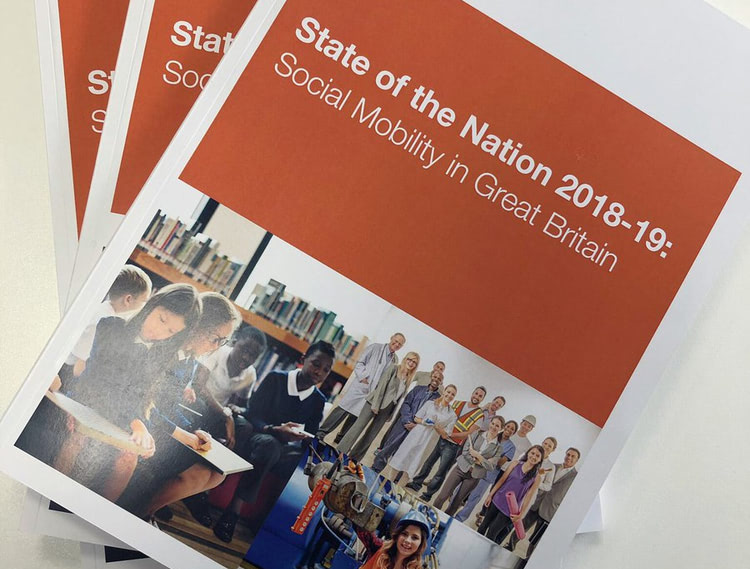#StateoftheNation We must all work together to create change in the lives of the most disadvantaged

Our State of the Nation 2018-19 report looking at the overall landscape of #socialmobility in Great Britain will be available on our website shortly after 10:30am! So keep a look out for the link ? #stateofthenation pic.twitter.com/nVRBfHGNOW
— Social Mobility Comm (@SMCommission) April 30, 2019
Social Mobility Commission report highlights damage done by grant cuts
The University and College Union (UCU) today (Tuesday) welcomed a call from the Social Mobility Commission to improve funding for students, especially those from the poorest backgrounds. In its State of the Nation report, the commission said social mobility had been stagnant since 2014.
Matthew Fell, CBI Chief UK Policy Director, said:
“Social mobility is fundamental to people feeling that the economy is working for them. Most companies understand their responsibilities and want to do even more to support the next generation of talented people from all backgrounds.
“Companies succeed when they embrace life-long learning and work with schools and colleges to give young people the best start in life. That’s why the Government must end the financial neglect of England’s further education system and carefully consider this recommendation as part of its Spending Review.”
 David Hughes, Chief Executive of the Association of Colleges, said:
David Hughes, Chief Executive of the Association of Colleges, said:
“The Social Mobility Commission report has challenging findings for the education system about the prospects and achievements of young people from disadvantaged backgrounds. For far too long the importance of funding for further education has been overlooked, despite the fact that nearly 700,000 young people are learning in colleges on a daily basis. The investment we make in the skills of young people is very low compared with other countries, meaning that opportunities to learn are often limited and they are more likely to have insecure jobs without training and development opportunities.
“The SMC supports our calls for better investment in colleges, and recommends an increase to 16-18 funding with a particular focus on disadvantaged young people by extending the pupil premium. Treasury and DfE should carefully consider these recommendations because they echo similar calls from many other reports and institutions, including employers groups such as the CBI. The case is so strong now, we simply are awaiting the Treasury to acknowledge and respond in the spending review this year.”
Lady Cobham CBE, Director General of The 5% Club, said:
“The Social Mobility Commission makes an important assertion that apprenticeships are a potentially powerful vehicle for social mobility. We welcome its recommendations for a fairer education system, including in opportunities to earn and learn. Not only do vocational schemes create opportunities in areas where they are needed, but they provide a diverse and talented workforce that British business and the economy so vitally needs.
“The Government needs to work with businesses to reverse the decline in apprenticeships and create more earn and learn opportunities nationwide. It should broaden the Apprenticeship Levy to allow investment in other high-quality skills training of the type needed by business. And it needs to help make finding opportunities easier by introducing a UCAS-style application system.
“Only then can UK PLC help to create a socially mobile and economically strong Britain.”
UCU acting general secretary Paul Cottrell said:
‘The government’s decisions to cut the EMA and university maintenance grants were pernicious moves that hit students who most needed support to stay on and get on in education the hardest.
‘We welcome the call from the Social Mobility Commission for greater support for education and the vital role it must be allowed to play if we are to improve social mobility. Education can only play its crucial role in improving people’s life chances if it gets proper government funding and support.’
Despite Michael Gove promising not to axe the Education Maintenance Allowance (EMA) for college students before the 2010 election, it was scrapped in October.
Chancellor George Osborne announced the end of grants for students from the poorest backgrounds in 2015, forcing students starting university in 2016 to take on larger debts.
In response to today’s report from the Social Mobility Commission, Education Secretary Damian Hinds said:
“We want to create opportunity for everyone. Employment has risen in every UK region under this government, wages are outstripping inflation, the gap between disadvantaged pupils and their peers has narrowed and the proportion of 16 and 17-year-olds in education or apprenticeships is at its highest ever.
“We are supporting pupils to thrive at every stage – setting a 10-year ambition to boost children’s early reading and communication skills, transforming technical education and providing coaching for young jobseekers.
“But we must all work together to create change in the lives of the most disadvantaged. I welcome Dame Martina’s leadership in this area, shining a light on where we can continue raising the bar.”
Early years
DfE are investing more than £3.5 billion this year alone in free early years education, and their 30 hours offer already supports many families from lower-incomes: a parent only has to earn just under £7,000 a year to be eligible, or a joint income of just under £14,000 for a couple. And more than 700,000 of the most disadvantaged two-year-olds are benefitting from their 15 hour offer.
Low income families – including parents working just eight hours a week – also have access to significant support through Universal Credit, which covers up to 85% of childcare costs.
Schools, post-16 and universities
Primary pupils are scoring their highest ever scores in international reading tests, and more than 163,000 six-year-olds are on track to become fluent readers thanks to the Government’s phonics screening check.
The proportion of pupils in good or outstanding schools has increased since 2010 and the attainment gap between disadvantaged pupils and their peers has fallen by 9.5%, and through the Pupil Premium DfE are investing £2.4 billion this year alone to support disadvantaged pupils’ education.
DfE have introduced reforms to make sure that higher education is open to everyone who has the talent and potential – and there is a record rate of disadvantaged 18-year-olds going to university, but it is important that we build on this progress.
The national funding formula for 16-19 year olds includes extra funding for disadvantaged students and we have protected the base rate of funding until the end of the current spending review period in 2020. The proportion of 16 and 17-year-olds in education or apprenticeships is at a record high.
Skills and Living Wage
Growth in employment is spread across our country – employment has risen in every UK region since 2010. Employment is up by over 3.6 million since 2010, with around 60% of the growth in employment being outside London and the South East.
Through Jobcentres there is a range of support helping disadvantaged groups into work including a new mentoring programme working with major employers to help coach young jobseekers on best practice when applying for work.











Responses